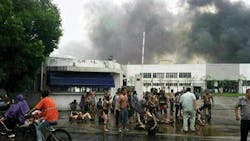Safety Questioned as China Plant Blast Deaths Rise to 71
SHANGHAI -- The death toll from an explosion at a Taiwan-invested car parts factory in China climbed to 71 on Sunday, state media said, as a labor rights group cast doubt on its safety measures.
The blast on Saturday in a wheel hub polishing workshop at the Zhongrong Metal Products Co. in Kunshan, near Shanghai, also left 186 injured, state television said, many with severe burns and respiratory problems.
The death toll, announced by city officials at a news conference on Sunday, rose as more bodies were discovered in the partly-destroyed factory, it said.
The firm manufactured for car companies, including General Motors.
Kunshan's mayor Lu Jun on Saturday classified the incident as a "severe" industrial accident, which a preliminary investigation showed was caused by the ignition of powder or dust from the production process.
Authorities have detained five company officials, the People's Daily newspaper reported. City officials said earlier that the executives responsible had been placed under control, but gave no number or names.
China has a dismal industrial safety record as some owners evade regulations to save money and pay off corrupt officials to look the other way.
U.S.-based China Labor Watch, a workers' rights group, said proper measures could have prevented the accident. "Safety measures like ventilation systems should have prevented such accumulation of dust particles. This tragedy is a result of lax safety standards in the workplace," it said.
Dust suspended in the air in the right concentration can cause explosions, according to safety experts, with even materials that do not normally burn in larger pieces becoming explosive in certain conditions.
Kunshan, in the eastern province of Jiangsu and known as a center for Taiwanese investment in China, was unable to handle the number of injured, with many sent to hospitals in surrounding areas including Shanghai.
A doctor treating the injured said this type of burn, caused by an explosion, presented special challenges to treat. "We have to think about infection," the doctor from Shanghai's Ruijin Hospital told state television. The blast tore the clothes off workers while the burns turned their skin grey or black, according to witnesses.
Supply Chain
Zhongrong was a contractor for a global supplier of GM, Dicastal, though the U.S. company did not have direct contact with it, GM said. "Our direct suppliers are required to source from tier-2 suppliers who must meet both in-country environment and safety standards, as well as quality standards," it said.
Citic Dicastal Wheel Manufacturing Co., set up in 1988, is mainland China's first aluminum alloy wheel maker, according to its website.
As well as the factory, China Labor Watch also took aim at GM, saying it "has a duty to ensure safe production in its supply chain and it shares responsibility for this deadly explosion.”
Chinese state media also weighed in, saying the explosion revealed "safety loopholes."
"Checks are usual, but after the checks, no one's really following any safety rules," a Zhongrong worker was quoted as saying by the Xinhua news agency.
China had 644 of what it calls "large" accidents in the first seven months of this year, killing 2,695 people, according to the State Administration of Work Safety.
Workplace accidents of all types killed nearly 70,000 people in China last year, showed separate figures from the National Bureau of Statistics.
In a similar accident two years ago, an explosion caused by combustible dust at an aluminum lock workshop in the eastern city of Wenzhou killed 13, according to state media.
The remnants of aluminum powder at an abandoned railway factory in Jiangsu exploded and killed 11 people in 2009.
- Bill Savadove, AFP
Copyright Agence France-Presse, 2014
About the Author
Agence France-Presse
Copyright Agence France-Presse, 2002-2025. AFP text, photos, graphics and logos shall not be reproduced, published, broadcast, rewritten for broadcast or publication or redistributed directly or indirectly in any medium. AFP shall not be held liable for any delays, inaccuracies, errors or omissions in any AFP content, or for any actions taken in consequence.
